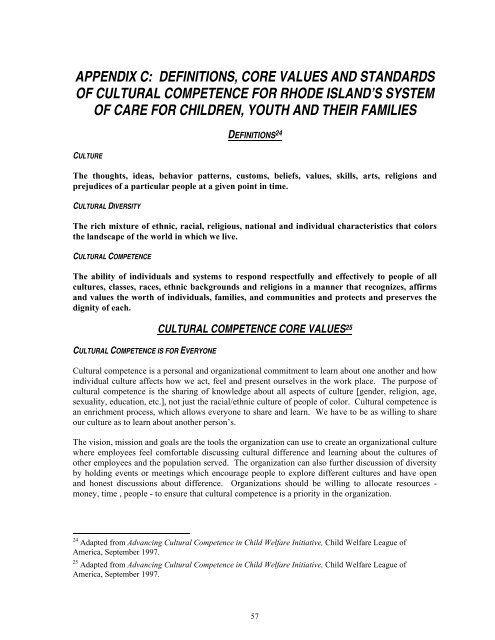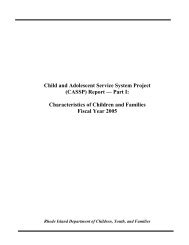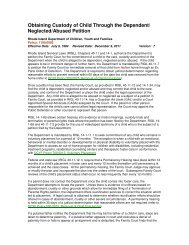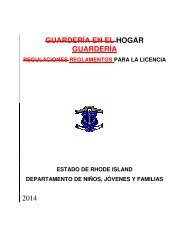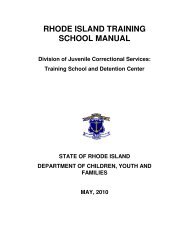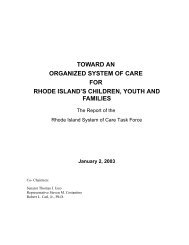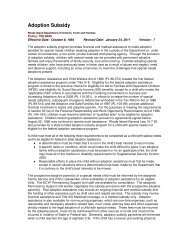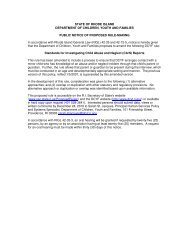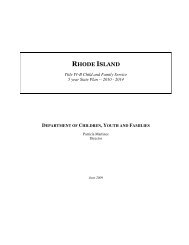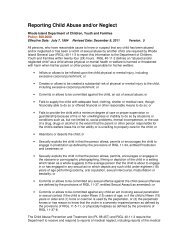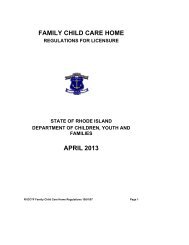system of care for rhode island's children, youth and families
system of care for rhode island's children, youth and families
system of care for rhode island's children, youth and families
You also want an ePaper? Increase the reach of your titles
YUMPU automatically turns print PDFs into web optimized ePapers that Google loves.
APPENDIX C: DEFINITIONS, CORE VALUES AND STANDARDS<br />
OF CULTURAL COMPETENCE FOR RHODE ISLAND’S SYSTEM<br />
OF CARE FOR CHILDREN, YOUTH AND THEIR FAMILIES<br />
CULTURE<br />
DEFINITIONS 24<br />
The thoughts, ideas, behavior patterns, customs, beliefs, values, skills, arts, religions <strong>and</strong><br />
prejudices <strong>of</strong> a particular people at a given point in time.<br />
CULTURAL DIVERSITY<br />
The rich mixture <strong>of</strong> ethnic, racial, religious, national <strong>and</strong> individual characteristics that colors<br />
the l<strong>and</strong>scape <strong>of</strong> the world in which we live.<br />
CULTURAL COMPETENCE<br />
The ability <strong>of</strong> individuals <strong>and</strong> <strong>system</strong>s to respond respectfully <strong>and</strong> effectively to people <strong>of</strong> all<br />
cultures, classes, races, ethnic backgrounds <strong>and</strong> religions in a manner that recognizes, affirms<br />
<strong>and</strong> values the worth <strong>of</strong> individuals, <strong>families</strong>, <strong>and</strong> communities <strong>and</strong> protects <strong>and</strong> preserves the<br />
dignity <strong>of</strong> each.<br />
CULTURAL COMPETENCE IS FOR EVERYONE<br />
CULTURAL COMPETENCE CORE VALUES 25<br />
Cultural competence is a personal <strong>and</strong> organizational commitment to learn about one another <strong>and</strong> how<br />
individual culture affects how we act, feel <strong>and</strong> present ourselves in the work place. The purpose <strong>of</strong><br />
cultural competence is the sharing <strong>of</strong> knowledge about all aspects <strong>of</strong> culture [gender, religion, age,<br />
sexuality, education, etc.], not just the racial/ethnic culture <strong>of</strong> people <strong>of</strong> color. Cultural competence is<br />
an enrichment process, which allows everyone to share <strong>and</strong> learn. We have to be as willing to share<br />
our culture as to learn about another person’s.<br />
The vision, mission <strong>and</strong> goals are the tools the organization can use to create an organizational culture<br />
where employees feel com<strong>for</strong>table discussing cultural difference <strong>and</strong> learning about the cultures <strong>of</strong><br />
other employees <strong>and</strong> the population served. The organization can also further discussion <strong>of</strong> diversity<br />
by holding events or meetings which encourage people to explore different cultures <strong>and</strong> have open<br />
<strong>and</strong> honest discussions about difference. Organizations should be willing to allocate resources -<br />
money, time , people - to ensure that cultural competence is a priority in the organization.<br />
24 Adapted from Advancing Cultural Competence in Child Welfare Initiative, Child Welfare League <strong>of</strong><br />
America, September 1997.<br />
25 Adapted from Advancing Cultural Competence in Child Welfare Initiative, Child Welfare League <strong>of</strong><br />
America, September 1997.<br />
57


